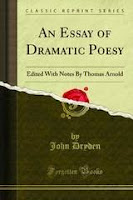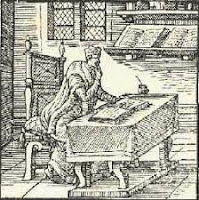The Three Unities by John Dryden
In his essay the three unities Dryden discuss the famous classical rules of the unity of time, place
and action. According to the rules of unity of time a play should present an
action of around 25 hours. The parts of time should be equally divided on the
stage. The ancient dramatics followed the rule very well to make their works
the nearest imitation of nature. Their drama present only the concluding main
part of the story, living the earlier
part for narration.
The second Unity , that is
the unity of place is achieved when the scene is continue in one and the same
place throughout the play. This unities also justified on the ground of
naturalness. But Dryden say that the variation of painted scenes of several places may have the appearance of
probability. Different places close to each other, as in the same town or city
may be comprehended under the large domination of one place “Dryden says, for
the observance of this next to the ancient the French to be most commendable.
The third unity is that of action. Dryden wants the poet to aim at one great and complete action. Everything in the play should be subservient to it. Dryden arouse that if a play present two important action it would really be two place not one and it will have no Unity. But he is not opposed to the presence of underplots, dealing with a number of actions. He given the example of the Latin play Eunuch by French presenting the marriage of Chaerea and chremess sister as its principal action. This action is promoted by the underplot dealing with the difference and reconciliation of Thais and Phaedria.
Dryden criticizes
modern play for their total violation of the rules of unities. These play
present whole age instead of the events of a day. The stage represent for them
not one town or city but many countries. Dryden does not want strict adherence
to the unities. Yet he is not in favour of materially affecting the unities. In
one of his late essay dedication of the Aeneis , he says. There is no such
absolute necessity that the time of a stage actions should so strictly be
confirm to 24 hours as never to exceed them, for which Aristotle contends; and
the Grecian stage practiced.
Dryden admires Shakespeare
who does not always observe the classical rules. Dryden is neo-classical critic
and has a great regard for Aristotle, but he believes in a writer’s freedom to
make light adjustment in the rules as he thinks that the spirit matters more
than the mechanical rule...





.jpg)
This comment has been removed by the author.
ReplyDeleteVery nice
ReplyDeletePerfect summary
ReplyDelete